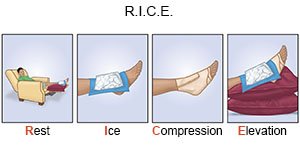Hip Contusion
Medically reviewed by Drugs.com. Last updated on Aug 4, 2025.
A hip contusion is a bruise that appears on the skin of your hip after an injury. A bruise happens when small blood vessels tear but the skin does not. When blood vessels tear, blood leaks into nearby tissue, such as soft tissue or muscle.
DISCHARGE INSTRUCTIONS:
Return to the emergency department if:
- You have severe pain in your hip.
- You have numbness in your leg or toes.
- You cannot put any weight on or move your hip.
Call your doctor if:
- Your pain does not decrease, even after treatment.
- You have questions or concerns about your condition or care.
Medicines:
- NSAIDs , such as ibuprofen, help decrease swelling, pain, and fever. This medicine is available with or without a doctor's order. NSAIDs can cause stomach bleeding or kidney problems in certain people. If you take blood thinner medicine, always ask if NSAIDs are safe for you. Always read the medicine label and follow directions. Do not give these medicines to children younger than 6 months without direction from a healthcare provider.
- Take your medicine as directed. Contact your healthcare provider if you think your medicine is not helping or if you have side effects. Tell your provider if you are allergic to any medicine. Keep a list of the medicines, vitamins, and herbs you take. Include the amounts, and when and why you take them. Bring the list or the pill bottles to follow-up visits. Carry your medicine list with you in case of an emergency.
Manage a hip contusion:
- Rest your injured hip or use it less than usual. You may need to avoid putting any weight on your hip for at least 48 hours. Return to normal activities as directed.
- Apply ice to decrease swelling and pain. Use an ice pack, or put crushed ice in a plastic bag. Cover the bag with a towel and place it on your bruise for 15 to 20 minutes every hour, or as directed.
- Use compression to support the area and decrease swelling. Wrap an elastic bandage around the area over the bruised muscle. Make sure the bandage is not too tight. You should be able to fit 1 finger between the bandage and your skin.
- Elevate (raise) your hip above the level of your heart to help decrease pain and swelling. Use pillows, blankets, or rolled towels to elevate the area as often as you can.
- Do not drink alcohol as directed. Alcohol may slow healing.
- Do not stretch the hip right after your injury. Ask your healthcare provider when and how you may safely stretch after your injury. Gentle stretches can help increase your flexibility.
- Do not massage the area or put heating pads on the bruise right after your injury. Heat and massage may slow healing. Your healthcare provider may tell you to apply heat after several days. At that time, heat will start to help the injury heal.
 |
Prevent another hip contusion:
- Stretch and warm up before you play sports or exercise.
- Wear protective gear when you play sports.
- If you begin a new physical activity, start slowly to give your body a chance to adjust.
Follow up with your doctor as directed:
You may need to return within a week to recheck your injury. Write down any questions you have so you remember to ask them during your visits.
© Copyright Merative 2025 Information is for End User's use only and may not be sold, redistributed or otherwise used for commercial purposes.
The above information is an educational aid only. It is not intended as medical advice for individual conditions or treatments. Talk to your doctor, nurse or pharmacist before following any medical regimen to see if it is safe and effective for you.
Further information
Always consult your healthcare provider to ensure the information displayed on this page applies to your personal circumstances.
